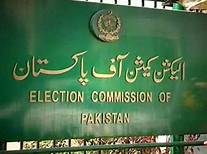
ISLAMABAD: Chief Justice of Pakistan (CJP) Qazi Faez Isa saved the Election Commission of Pakistan (ECP) on Monday during a flurry of interrogation by emphasizing that the commission was an independent body endowed with the constitutional right to hold elections, not a body subservient to the government or the Supreme Court.
The CJP noted that ideally, every institution should operate within its own defined realm and that the Supreme Court can only exercise its authority if it is persuaded that the commission has exceeded its constitutional function. A full Supreme Court bench led by the Chief Justice was deliberating over a series of appeals filed by the Sunni Ettehad Council (SIC) regarding the denial of reserved seats to female and non-Muslim candidates.
In order to determine the differences, the Supreme Court directed the ECP to apply the methodology for allocating reserved seats among political parties based on the outcomes of the 2018 election, both by excluding and adding independents. The bench wants to comprehend the precise calculations used to allocate reserved seats in relation to the election outcomes on February 8, 2024.
The Chief Justice expressed regret, saying, “Unfortunately, we go to the minutest of details as if we are sitting as an appellate court of ECP.” The CJP further stated that the Supreme Court could not review the election process unless it was presented with a specific case involving actual election rigging at a lower level.
Chief Justice Isa said that no election in the nation has ever been recognized or received public support as the losing parties have consistently portrayed elections as frauds or rife with electoral fraud because we don’t respect the institutions.
The leaders of the government and opposition parties in parliament choose the chief election commissioner following consultations, in contrast to judges who are chosen by the Pakistani Judiciary Commission, the CJP resigned.
The CJP emphasized, “We may disagree with the commission’s conduct, but we will only get involved when ECP violates the law and the Constitution.” The Constitution, it was noted, was written for the people of Pakistan, not for judges or attorneys. Written judgments ought to be comprehensible to even a matriculation student.
Justice Athar Minallah noted during the hearing that political parties were the fundamental tenet of Article 51 of the Constitution. However, the actual question that needed to be answered was whether the ECP could exclude a political party from the elections based on a misinterpretation of certain rulings (such as the Jan. 13, 2024, ruling on the denial of PTI access to the common election symbol).
Judge Minallah stated that while the party position would be determined later, the act of ECP dismantling a significant political party remained the central issue in the case.
Since the court has been hearing statements from ECP regarding political parties and independents for the past four days, Justice Ayesha A. Malik expressed sadness that it seemed as though the mechanism for allocating reserved seats had been left up to them to do as they pleased.
Mansoor Usman Awan, the Attorney General for Pakistan (AGP), said that the petitioners argued that since they had joined a political party (SIC), it should be recognized as such and be granted allocated seats.
The arguments of ECP
Previously, Gohar Ali Khan, in his capacity as PTI chairman, was said to have signed both the party affiliation certificates and the list of candidates for the reserved seats under Section 66 of the Elections Act 2017 by ECP attorney Sikandar Bashir Mohmand. However, because the PTI had not had intra-party elections in compliance with Section 208 read with 209 of the Elections Act, the ECP refused to recognize the party’s organizational structure.
Although not all of the party affiliation certificates were granted on the same date, the counsel acknowledged that the dates of the certificates provided by the SIC candidates on January 13, 2024, were accurate. He claimed that as a result, the certificates were null and invalid and had no legal standing.
The lawyer stated that the ECP’s order against the PTI was issued on December 22, 2023, and that on January 10, 2024, the Peshawar High Court (PHC) upheld the ECP’s decision to refuse the electoral symbol.
Regarding Sahibzada Hamid Raza, the attorney stated that, given his position as SIC chairman, he ought to have chosen to formally register as a SIC party affiliation and, after doing so, have been eligible to run for office as a SIC candidate. The ECP’s condition of having elected to at least one seat in the general elections would have been satisfied if this had been done and he had won the elections. However, the attorney claimed that this was not done for reasons that only he knew.
Judge Malik cited the application presented by the Advocate General of Khyber Pakhtunkhwa, requesting that the Balochistan Awami Party be granted reserved seats by the ECP for the year 2019. The party did not contest the polls from Khyber Pakhtunkhwa, nor did it submit a list of candidates for the reserved seats for women.
The attorney emphasized that the judgment was taken because of the unique circumstances surrounding the 25 Amendment, which resulted in the merger of the former Fata districts with KP. Justice Malik expressed disappointment that ECP was making decisions based on its interpretation of the laws, as it had chosen to do. Justice Malik stated that there needs to be some consistency, noting that it appeared the panel was making everything up as it went along.
Nonetheless, the attorney claimed that the decision was per in curium and lacked specificity. Gohar Ali Khan, the chairman of the PTI, announced that he had submitted two nomination papers: one as an independent and the other as a PTI candidate. He noted that most of the records had been hidden from the court by ECP.








